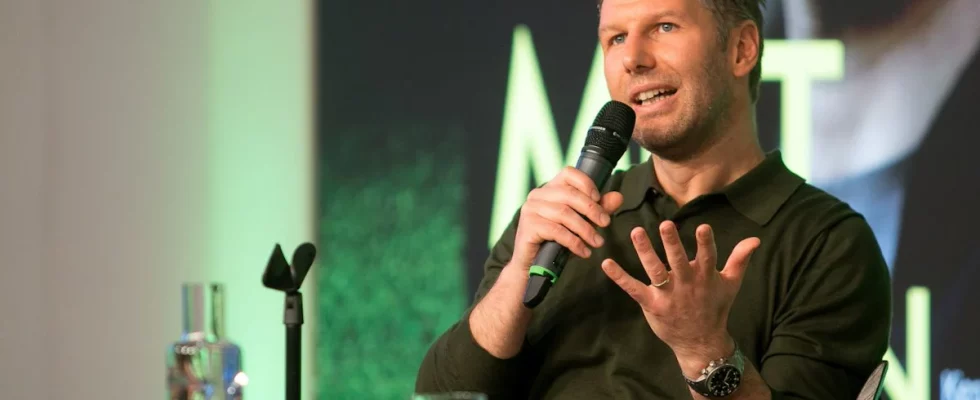A virtual lawn lights up in the background, an ex-professional and a presenter talk on stage – a lot of it is reminiscent of a football talk. But some things are irritating: the spectators wear shirts instead of jerseys, the speakers drink water instead of beer and the protagonist of Monday evening is not a ranting poltergeist.
The former football player Thomas Hitzlsperger and the sports journalist Jochen Breyer are guests at the Literaturhaus Munich. They talk about Hitzlsperger’s book, which he wrote together with SZ author Holger Gertz. It’s titled “Test of Courage”, not “I showed everyone” (Stefan Effenberg) or “I’m actually a great guy” (Mario Basler). It tells of the courage that led him to Birmingham as a teenager, enabled him to have a European career and then made him an exceptional figure.
For Thomas Hitzlsperger, the evening is a home game. He comes from Forstinning in the Ebersberg district. Brother, uncle and cousin are sitting in the audience. And he quickly seems at home on the stage of the Literaturhaus. Only for Tanja Graf, head of the Literaturhaus, does the gap between football and literature initially seem very large. In her charming introduction, she diligently mentions that Hitzlsperger has a favorite book (“The Life of My Mother” by Oskar Maria Graf) and has appeared with literary critic Dennis Scheck.
On the real pitch, Hitzlsperger shone above all with the power of his incomparable left foot (nickname: “Hitz, the Hammer”). In front of the virtual lawn, however, he acts elegantly, eloquently and thoughtfully. The left foot rests tamed under the table. Hitzlsperger talks about his career, especially the depths. Instead of talking about the championship with VfB Stuttgart in 2007 or the European Championship in 2008, he reads a passage about his time at Lazio. He lived alone in the hotel and didn’t play, if he did, he played badly. He shows himself vulnerable. Such insights are very rare in football talks.
The interaction with Breyer is wonderfully harmonious, not only because both wear long-sleeved polo shirts, which Xabi Alonso made the uniform of the good-looking man in football. They share a critical view of sport and both researched the depths of the World Cup in Qatar. It is noticeable that they are friends with each other, they play one-twos with virtuosity.
Anti-gay chatter in the locker room
Their friendship brought them together for a conversation ten years ago. Claus Kleber actually wanted him for that today’s Journal Be sure to question him yourself, but Hitzlsperger was only willing to talk to Breyer. When the video of the only television interview is played immediately after his coming out, Hitzlsperger seems embarrassed for the first time that evening. Maybe because of his old hairstyle, maybe because the day is so important to him. And also for Germany, says Breyer. Hitzlsperger bobs his head modestly.
He offers intimate insights into the long preparation for this day. The right moment to come out never came during his career, especially because he heard anti-gay chatter in the dressing room. Personally, it wasn’t easy either. He comes from an environment in which “the Greens” were not elected; being gay was a “form of difference that was not accepted.” He talks about the moment when he told his parents and had to drink beer to build up his courage.
He promotes tolerance, including in schools
A lot of time has passed since the interview. A lot has changed. Several football players have come out. But so far none in Germany. Hitzlsperger encourages him; for him there is “no argument in this country why one should hide one’s sexual orientation.” He promotes tolerance and speaks not only at the Literaturhaus, but also at schools.
Of course there has to be a little football talk this evening, the situation at FC Bayern is too pressing. Hitzlsperger played there as a youth – even though he comes from a lion family. He asks the audience: “Does anyone have a trainer’s license?” It’s a shame that Hitzlsperger didn’t aim for a coaching bench. But on the other hand, such an evening and such a book would be greatly missed.
Holger Gertz describes Hitzlsperger as a “seeker”. This hurt him at first, says he, 42 years old and still searching. But without a doubt, it is better to look for answers than to give them without looking, as happens again and again in football talk. It is often complained that there are no longer any “real guys” in German football. This evening it becomes clear once again: Hitzlsperger is one.

